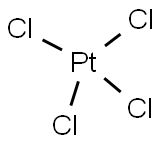Platinum tetrachloride
Synonym(s):Platinum tetrachloride;Platinum(IV) chloride (57.5% Pt)
- CAS NO.:13454-96-1
- Empirical Formula: Cl4Pt
- Molecular Weight: 336.89
- MDL number: MFCD00011182
- EINECS: 236-645-1
- SAFETY DATA SHEET (SDS)
- Update Date: 2025-07-04 15:06:07

What is Platinum tetrachloride?
Chemical properties
Brown/Red Crystals
The Uses of Platinum tetrachloride
Platinum(IV) chloride is used as a catalyst and analytical reagent. Further, it is used in the production of semiconductor epitaxy and in electroplating process. It is involved in the preparation of platinum(II) chloride .
Production Methods
PtCl4 is formed directly from the elements or by heating hexachloroplatinic (IV) acid.
Safety Profile
Poison by ingestion and intravenous routes. Experimental reproductive effects. Mutation data reported. A severe skin irritant. When heated to decomposition it emits toxic fumes of Cl-. See also PLATINUM COMPOUNDS.
Properties of Platinum tetrachloride
| Melting point: | 370 °C (dec.)(lit.) |
| Density | 4.303 g/mL at 25 °C(lit.) |
| storage temp. | Store below +30°C. |
| solubility | 587g/l |
| form | Powder |
| color | Red-brown |
| Specific Gravity | 4.303 |
| PH | <1 (H2O, 20℃) |
| Water Solubility | 587 g/L (25 ºC) |
| Sensitive | Hygroscopic |
| Exposure limits | ACGIH: TWA 0.002 mg/m3 NIOSH: IDLH 4 mg/m3; TWA 0.002 mg/m3 |
| CAS DataBase Reference | 13454-96-1(CAS DataBase Reference) |
| EPA Substance Registry System | Platinum tetrachloride (13454-96-1) |
Safety information for Platinum tetrachloride
| Signal word | Danger |
| Pictogram(s) |
 Corrosion Corrosives GHS05  Skull and Crossbones Acute Toxicity GHS06  Health Hazard GHS08 |
| GHS Hazard Statements |
H301:Acute toxicity,oral H314:Skin corrosion/irritation H317:Sensitisation, Skin H334:Sensitisation, respiratory |
| Precautionary Statement Codes |
P260:Do not breathe dust/fume/gas/mist/vapours/spray. P280:Wear protective gloves/protective clothing/eye protection/face protection. P301+P330+P331:IF SWALLOWED: Rinse mouth. Do NOT induce vomiting. P303+P361+P353:IF ON SKIN (or hair): Remove/Take off Immediately all contaminated clothing. Rinse SKIN with water/shower. |
Computed Descriptors for Platinum tetrachloride
| InChIKey | LYTASJYXLSPLTL-UHFFFAOYSA-J |
Platinum tetrachloride manufacturer
JSK Chemicals
3Y
Phone:+91-9879767984
Whatsapp: +91-9879767970
product: Platinum(IV) chloride, 98% 99%
Vineeth Precious Catalysts Pvt. Ltd.
Maharashtra
Phone:91-8149095778
Whatsapp: 91-8149095778
product: Platinum(IV) chloride
ASM Organics
Andhra Pradesh
Phone:91-9866122393
Whatsapp: 91-9866122393
product: Platinum(IV) chloride
New Products
4,4-Difluoropiperidine hydrochloride tert-butyl 9-methoxy-3-azaspiro[5.5]undecane-3-carboxylate Indole Methyl Resin N-Isopropylurea N,N-Dicyclohexylcarbodiimide(DCC) MELDRUMS ACID 5-METHYLISOXAZOLE-4-CARBOXYLIC ACID Magnessium Bis glycinate Zinc ascorbate 1-bromo-2-butyne 2-acetamidophenol 9(10H)-anthracenone Erythrosin B, 4-Piperidinopiperidine 2-((4-morpholinophenylamino) (methylthio) methylene) malononitrile 2,4-dihydroxybenzaldehyde 3-(4-morpholinophenylamino)-5-amino-1H-pyrazole-4-carbonitrile Methyl 2-methylquinoline-6-carboxylate 2,6-dichloro-4-nitropyridine 4-Bromo-2-chlorobenzonitrile 2-(benzylamino)acetic acid hydrochloride 4-(tert-Butoxycarbonylamino)but- 2-ynoic acid 3,4-dihydro-2H-benzo[b][1,4]dioxepine 1-Phenyl-1-cycloprppanecarboxylicacidRelated products of tetrahydrofuran








You may like
-
 Platinum(IV) chloride CAS 13454-96-1View Details
Platinum(IV) chloride CAS 13454-96-1View Details
13454-96-1 -
 Platinum(IV) chloride CAS 13454-96-1View Details
Platinum(IV) chloride CAS 13454-96-1View Details
13454-96-1 -
 Platinum(IV) chloride, Pt 57% min. CAS 13454-96-1View Details
Platinum(IV) chloride, Pt 57% min. CAS 13454-96-1View Details
13454-96-1 -
 Platinum(IV) chloride, Pt 57% min. CAS 13454-96-1View Details
Platinum(IV) chloride, Pt 57% min. CAS 13454-96-1View Details
13454-96-1 -
 Platinum(IV) chloride CAS 13454-96-1View Details
Platinum(IV) chloride CAS 13454-96-1View Details
13454-96-1 -
 Platinum(IV) chloride 98% 54% PT Min CAS 13454-96-1View Details
Platinum(IV) chloride 98% 54% PT Min CAS 13454-96-1View Details
13454-96-1 -
 Platinum Chloride Powder, 25kg BagView Details
Platinum Chloride Powder, 25kg BagView Details
10025-65-7 -
 Powder Industrial Platinum ChlorideView Details
Powder Industrial Platinum ChlorideView Details
10025-65-7
Statement: All products displayed on this website are only used for non medical purposes such as industrial applications or scientific research, and cannot be used for clinical diagnosis or treatment of humans or animals. They are not medicinal or edible.
